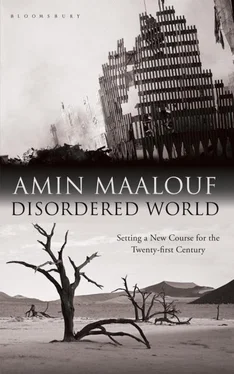Pretending to ignore physical or cultural differences would be absurd, but it would be missing something essential if one limited oneself to the most obvious differences instead of going further towards the person himself as an individual.
Respecting someone means addressing him or her as a whole human being, as a free adult, not as a dependent being who belongs to his community like a serf to the land.
Respecting the Algerian woman would have meant respecting the individual who had devised a project and had the courage to go and present it to the authorities. Rather than dragging her back under the rule of her community leader.
I chose something which happened in Amsterdam as an example on purpose. Ever since the seventeenth century, Amsterdam has been a city which has played a pioneering role in Europe’s slow march towards religious tolerance. And I believe that the town hall official who consulted the local imam thought she was acting in complete accord with the spirit of openness which has always characterised the city.
That, after all, was the way that tolerance worked four centuries ago. Religious minorities were authorised to practise their faith freely. And if a member of one of these communities behaved in a reprehensible way, he was firmly brought back into line by his own community leaders. That is how Spinoza came to be excommunicated by his fellow Jews in 1656, when his supposed atheism threatened to compromise relations with their Christian fellow citizens. The question was made all the more sensitive as many Jews, including Spinoza’s own father, had arrived in Amsterdam relatively recently after their expulsion from the Iberian peninsula, and did not want to be suspected of behaving disloyally to their hosts, who, given the period, had behaved with unusual magnanimity.
Today’s realities are different and infinitely more complex, and attitudes do not have the same meaning. In our epoch, which is menaced by a drift towards global communitarianism, yoking men and women to their religious communities makes problems worse rather than better. Yet that is what numerous European countries do when they encourage immigrants to organise themselves on a religious basis and when they favour the emergence of community spokesmen.
The West has often made this mistake in its dealings with the rest of the world. For centuries it was incapable of applying to other people — especially those whose destinies it controlled — the same principles it applied to its own, principles that were the source of its greatness. That is why France as a colonial power, for example, in order to avoid granting the inhabitants of its Algerian départements full citizenship, restricted them to the status of ‘French Muslims’, a rather anomalous designation in a secular republic.
It is important to remember the mistakes of the past in order to avoid repeating them. In colonial times, relations between the dominant and the dominated could not have been anything but unhealthy, since the genuine desire to ‘civilise’ the Other was constantly in conflict with the cynical desire to subjugate him. It must be acknowledged, as Hannah Arendt says in The Origins of Totalitarianism , that nation states make very poor empire-builders, since empire-building needs to be accompanied by a certain respect for the peoples you want to gather together. Alexander the Great dreamed of mass marriages between Hellenes and Persians; Rome cherished Athens and Alexandria and ended up granting Roman citizenship to all the subjects of its empire, from Celtic Druids to the Bedouins of Arabia. Closer to our own time, the Austro-Hungarian and Ottoman empires sought to be inclusive, with varying degrees of success. But the colonial empires built by European nations in the nineteenth and twentieth centuries were never more than extensions of themselves, schools of applied racism and moral transgression that prepared the way for the wars, genocides and totalitarianism that were to steep Europe in blood.
Our period offers the West the chance to restore its moral credibility, not by donning sackcloth and ashes, nor in opening itself up to all the world’s woes, nor in compromising with values imported from elsewhere, but rather in showing itself at last to be true to its own values — respectful of democracy and human rights, concerned about equity, individual freedom and secularism — in its relations with the rest of the planet, and above all with the men and women who have chosen to live under its roof.
The attitude of Western countries towards their immigrants is not just one issue among many. In my view — and not just because I am an immigrant myself — it is a crucial question.
If the world is divided today between rival civilisations, it is principally in the minds of immigrants, both men and women, that a clash of civilisations occurs. It was no accident that the most bloody and spectacular terrorist attacks of recent years — in New York, Madrid, London and elsewhere — were carried out by immigrants, some from the Indian subcontinent, others from North Africa or Egypt, such as the Islamist militant who directed the attack on the Twin Towers of the World Trade Center and who had just completed his doctorate in urbanism at a German university. At the same time, many migrants take part peacefully and generously in the intellectual, artistic, social, economic and political life of their new countries, contributing new ideas, rare skills, different sounds, tastes and sensibilities, allowing those societies to be in tune with the world, giving them the ability to know it intimately in all its diversity and complexity.
So I say unambiguously, choosing my words with care: it is above all among immigrants that the great battle of our time, a battle for hearts and minds, will have to be waged, and it is among them that it will be won or lost. Either the West will manage to win them back, to regain their confidence, to rally them to the values it espouses, making them into eloquent advocates in its relations with the rest of the world. Or they will become its biggest problem.
The battle will be tough and the West is no longer in a very good position to win it. In the past, the only things hindering its room for manoeuvre were economic constraints and its own cultural prejudices. Today, it has a formidable adversary to deal with: all those people whose identities have been crushed for so long and whose thoughts have turned murderous. All that immigrants in the past, like colonial peoples, asked for was that the ruling power behave more like a mother than a stepmother. Their children, whether out of bitter disappointment, pride, weariness or impatience, no longer want that sort of relationship. They brandish the symbols of their origins and sometimes act as though their adoptive homes were enemy territory. The integration machine, which used to work, albeit rather slowly, has ground to a halt, sometimes as a result of deliberate sabotage.
For someone like me, who has lived in Europe for over thirty years and observed the coexistence of different ethnic communities slowly breaking down in numerous countries despite the fact that they practise quite different immigration policies, there is a strong temptation to throw up one’s hands. I cannot be the only one to have had the depressing feeling that no approach brings the desired result — neither the strictest nor the most permissive; neither the ambitious republican model, which is supposed to make every immigrant to France entirely French, nor the pragmatic model from across the Channel, which accepts each community’s uniqueness without trying to make it English.
Equally distressing, for the concerned observer such as myself, have been the murder of the Dutch film-maker Theo van Gogh, the demonstrations linked to the Danish cartoons, and dozens, hundreds of other worrying symptoms which have happened in almost every country and are replete with physical or moral violence.
Читать дальше












